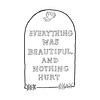Take a photo of a barcode or cover
The stars, like dust, encircle me
In living mists of light;
And all of space I seem to see
In one vast burst of sight
In living mists of light;
And all of space I seem to see
In one vast burst of sight
It was fine. Not as engrossing as the other Asimov stuff I've read but a decent diversion.
This book was a disappointment after the total love I have for I,Robot. It was frequently sexist and the plot was repeatedly advanced by info dumps from the clever MC who had figured out things and then deigned to share it with his colleagues (and the reader). I've heard it was Asimov's least favorite of all his novels. It won't stop me from reading other Asimov, but unless you're determined to read every single novel that takes place in the same universe as the Foundation series, give it a miss.
adventurous
tense
fast-paced
Plot or Character Driven:
Plot
Strong character development:
No
Loveable characters:
Complicated
Diverse cast of characters:
No
Flaws of characters a main focus:
No
adventurous
challenging
informative
mysterious
fast-paced
Plot or Character Driven:
A mix
Strong character development:
Yes
Loveable characters:
Complicated
Diverse cast of characters:
No
Flaws of characters a main focus:
Complicated
As good as Asimov is at writing informative science and strong fiction, he sucks at romance. Is this a 1950s problem? Maybe. Could it also be that Asimov can’t write well developed women? Probably.
Lucky for him, I can forgive that and just focus on the space travel. But if you want strong science fiction with equally strong female characters, Asimov can not deliver.
Lucky for him, I can forgive that and just focus on the space travel. But if you want strong science fiction with equally strong female characters, Asimov can not deliver.
Moderate: Death, Misogyny, Sexism
It's probably the most amusing last paragraph I've ever read
“The stars, like dust, encircle me
In living mists of light;
And all of space I seem to see
In one vast burst of sight.”
In living mists of light;
And all of space I seem to see
In one vast burst of sight.”
This is supposed to be the first book in the Galactic Empire series, but it most definitely is not. I have a few different reasons for thinking this:
1) This was written as Isaac Asimov's second novel and it is quite clear that the Foundation Universe was not in his mind when this was written.
2) In this book, there are only about 1,100 worlds that have been colonized. In the following two books of the Empire series, there are hundreds of millions.
3) Nowhere in this book is Trantor, or even the idea or need for a Trantor like empire ever even remotely mentioned.
4) The big reveal mentioned at the end makes it very clear that whatever is to follow the conclusion of this book, it is most definitely not the birth of an empire.
5) There are continuity problems in the other direction as well. The largest of these is that earth was supposedly made largely uninhabitable because of a previous nuclear war. The end of the Robot series gives a very different reason for earth's irradiation.
So, this is not Galactic Empire #1 no matter what Goodreads, Wikipedia, and Isaac Asimov himself say. He only says it so that all his sci-fi fiction can be neatly lumped into one overarching plotline no matter how mendacious the attempt might be. The book is a good example of classic 50's sci-fi and enjoyable when viewed in that light. Just try to not be offended by the chauvinistic view of women (they are to be cherished and protected, but not taken seriously), the fear of some nuclear holocaust, the dogmatic hatred of all things Tyranni(cal), and the absolutely ridiculous "big-reveal" at the end.
1) This was written as Isaac Asimov's second novel and it is quite clear that the Foundation Universe was not in his mind when this was written.
2) In this book, there are only about 1,100 worlds that have been colonized. In the following two books of the Empire series, there are hundreds of millions.
3) Nowhere in this book is Trantor, or even the idea or need for a Trantor like empire ever even remotely mentioned.
4) The big reveal mentioned at the end makes it very clear that whatever is to follow the conclusion of this book, it is most definitely not the birth of an empire.
5) There are continuity problems in the other direction as well. The largest of these is that earth was supposedly made largely uninhabitable because of a previous nuclear war. The end of the Robot series gives a very different reason for earth's irradiation.
So, this is not Galactic Empire #1 no matter what Goodreads, Wikipedia, and Isaac Asimov himself say. He only says it so that all his sci-fi fiction can be neatly lumped into one overarching plotline no matter how mendacious the attempt might be. The book is a good example of classic 50's sci-fi and enjoyable when viewed in that light. Just try to not be offended by the chauvinistic view of women (they are to be cherished and protected, but not taken seriously), the fear of some nuclear holocaust, the dogmatic hatred of all things Tyranni(cal), and the absolutely ridiculous "big-reveal" at the end.
Una din cele mai slabe carti din universul Fundatiei, din pacate.
adventurous
mysterious
medium-paced
Plot or Character Driven:
Plot
Strong character development:
No
Loveable characters:
Complicated
Diverse cast of characters:
No
Flaws of characters a main focus:
No



